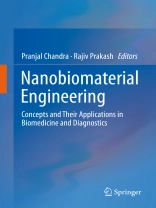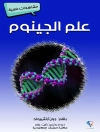This book comprehensively documents the application of Nanobiomaterials in the field of bio-medicine and diagnostics technologies by involving classical concepts/examples. Nanobiotechnology is an emerging area which encompasses all the facets of research of nano and biomaterials with their interaction with biological systems. The book briefly summarizes the various types of Nanomaterial’s, and highlights the recent developments in the synthesis of the nanomaterials for the diagnostic and therapeutic biomedical applications. It skilfully reviews the utilization of the nanomaterials alone or in combination with other bio-molecules as a contrast enhancer in in-vivo imaging, Nano-Theranostics, drug delivery, and sensing transducer matrix. It also discusses the current research on designing of the new Nanobiomaterials and their implementation in numerous fields including bio-medicine and diagnostics. Finally, it summarizes the future prospects and thecommercial viability of Nanobiomaterials in the human health care.
Daftar Isi
Chapter 1 . Nanomaterials, classifications, and properties.-
Chapter 2. Engineering nanomaterials for bio-interfacing.-
Chapter 3. Biomaterials and surface modification strategies.-
Chapter 4 . Nano materials as a nanotheronostic agent.-
Chapter 5. Nanobiomaterials in biomedicine: Designing strategies and critical concepts.-
Chapter 6 . Phytofabricated nanodelivery systems: Engineering principles and applications.-
Chapter 7. Nanobiosensors based diagnostics system: Transducers and surface materials.-
Chapter 8. Nanobiomaterials and nanocomposites in clinical diagnostics.-
Chapter 9. Tissue Engineering and Regenerative Medicines based on nanobiomaterials.-
Chapter 10. Prospects and advantages of microfluidics utilizing various nanobiomaterials.-
Chapter 11. Electrochemical nanoengineered sensors in infectious disease diagnosis.-
Chapter 12. Multiplexing utilizing various nanobiomaterials.-
Chapter13. Future perspects of nanobiomaterials in human health care.-
Chapter 14. Commercial aspects of nanobiomaterials: Short-coming and future aspects.
Tentang Penulis
Prof. Pranjal Chandra is currently employed as Assistant Professor at the School of Biochemical Engineering, Indian Institute of Technology (BHU), Varanasi, India. He earned his Ph.D. from Pusan National University, South Korea and did post-doctoral training at Technion-Israel Institute of Technology, Israel. His research focus is highly interdisciplinary, spanning a wide range in biotechnology, nanobiosensors, material engineering, nanomedicine etc. He has designed several commercially viable biosensing prototypes that can be operated for onsite analysis for biomedical diagnostics. He has published 4 books on various aspects of biosensors / medical diagnostics from IET London, Springer Nature, CRC press USA. He has also published over 85 journal articles in topmost journals of his research area. His work has been greatly highlighted in over 300 topmost news agencies globally including Rajya Sabha TV, DD Science, Science Trends USA, Nature India, Vigyan Prasar, Global Medical Discovery; Canada, APBN Singapore, Business Wire; Dublin etc. He is recipient of many prestigious awards and fellowships such as; DST Ramanujan fellowship (Government of India); ECRA (DST, Government of India); BK -21 and NRF fellowship, South Korea; Technion post-doctoral fellowship, Israel; NMS Young scientist award, BRSI Young Scientist Award, Young Engineers Award 2018, RSC Highly Cited Correspondong Author Award (general chemistry); ACS / Elsevier Outstanding Reviewer Awards etc. He is reviewer of over 40 international journals and expert project reviewer of various national / international funding agencies. He is Associate Editor of Sensors International and an editorial board member of a Materials Science for Energy Technologies by Ke Ai and Elsevier, World journal of methodology, USA; Frontiers of Biosciences, USA; Reports in Physical Sciences, Singapore.
Prof.Rajiv Prakash received his M. Tech. degreein Materials Technology from Institute of Technology, Banaras Hindu University IIT (BHU), Varanasi, India and did his Ph.D. work from Tata Institute of Fundamental Research, Mumbai, India. Presently, he is Professor in the School of Materials Science and Technology, Dean (Research and Development) of the institute, and Professor-in-charge of the Central Instrument Facility. He was also a visiting scientist/professor at the University of Applied Sciences, Germany and Kyushu Institute of Technology, Japan (under DST-JSPS). Before joining IIT (BHU), Varanasi he has served as Scientist in the CSIR laboratory Lucknow, India for more than 7 years. He has been recipients of many awards including Young Scientist Award (Council of Science and Technology), Young Engineer Awards (Indian National academy of Engineering) of India and Materials Society Medal Award of India. He is elected as Academician of Asia Pacific Academy of Materials in 2013. His current research interests include morphology controlled synthesis of electronic polymers, nanocomposites, fabrication and characterization of organic electronic devices, sensors/biosensors, and Nanobioengineering. Till now, he has more than 160 publications in international journals of repute and 20 patents to his credit (out of which two technologies transferred for commercialization). He is on the Editorial Board of several National and International Journals. His interdisciplinary research work has been highly cited and featured on various platforms including nature news. He is the member of various national committees including India Vision Plan 2035 of DST-TIFAC, and “IMPRINT” program of MHRD, Government of India.












